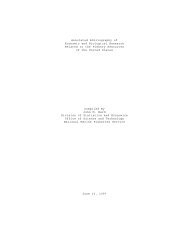West Coast Groundfish Observer Program Manual, Part2 - NOAA
West Coast Groundfish Observer Program Manual, Part2 - NOAA
West Coast Groundfish Observer Program Manual, Part2 - NOAA
You also want an ePaper? Increase the reach of your titles
YUMPU automatically turns print PDFs into web optimized ePapers that Google loves.
APPENDIX O<br />
may need to be considered. This final rulemaking does not preclude further development of<br />
alternative sampling methods for vessels that are determined to be unsuitable for observers.<br />
Comment 3: If you are one of those that is required to have an observer and you do not know 24<br />
hours in advance when you are going, because you are looking for the weather to break, that means a<br />
lot of times in the winter that you won’t go fishing because you cannot get an observer.<br />
Response: A departure report is necessary for NMFS or its designated agent to identify which<br />
vessels need to carry observers and to coordinate the placement of observers aboard vessels. It is<br />
necessary for vessel owners, operators or representatives to submit these reports because only they<br />
can make statements about their future intent. NMFS recognizes that vessels need to wait for<br />
favorable weather and sea conditions before departing on fishing trips. Language has been added to<br />
the rule in section 660.360(c)(2)(i)(B) to obtain the necessary information to ensure that an observer<br />
is available while allowing for possible delays in vessel schedules as a result of poor weather or sea<br />
condition. The initial contact between NMFS and the individual representing the vessel is still<br />
necessary to identify that the vessel intends to depart for fishing, when the weather or sea conditions<br />
are favorable. As conditions improve, the individual representing the vessel need only provide 4<br />
hours notice before the anticipated departure.<br />
Comment 4: In various places in the EA, it suggests that the program is contingent on Federal<br />
funding. If a program is contingent on Federal funding, it would violate the Magnuson Stevens<br />
Fishery Conservation and Management Act.<br />
Response: NMFS disagrees with this comment. Nowhere in the rulemaking documents or in the<br />
EA does it state that an observer program is contingent on Federal funding. This final rulemaking<br />
establishes the framework necessary to support an at-sea observer program. It includes regulations<br />
that require vessels to carry observers when notified, provide notification of fishing schedules,<br />
provide food and accommodations, and a suitable location for observers to safely collect sample data<br />
according to scientific sampling protocols. The analysis examined the impacts resulting from a<br />
federally funded program because no additional rulemaking would be required before a program<br />
could be implemented if it were federally funded. Therefore, Federal funding was analyzed to<br />
facilitate the implementation of an observer program should Federal funding become available. This<br />
final rulemaking does not preclude NMFS or the Council from exploring alternative funding options<br />
or from providing fishermen with greater compensation for all or a portion of the costs of carrying<br />
an observer. Such measures would build upon this final rulemaking and would require additional<br />
rulemaking and analysis before implementation.<br />
Classification<br />
NMFS prepared an EA for this final rule and concluded that there will be no significant impact<br />
on the human environment as a result of this final rule. This final rulemaking will have no direct<br />
biological or physical impacts on the environment. It is NMFS’s intention, to provide for observer<br />
training and the direct costs of deploying observers including salaries, payroll taxes, employment<br />
insurance, medical insurance, pension, and travel costs. The observers’ employer will provide<br />
protection and indemnity insurance to cover bodily injury or property damage claims that may result<br />
from actions of the observer. Vessels will be responsible for providing information regarding their<br />
fishing schedule, and food and accommodations, for the observers. Some of the smallest groundfish<br />
vessels may find that crew members are displaced because limited bunk space must be allocated to<br />
the observer. Vessels will also need to provide adequate sampling facilities and unobstructed access<br />
to catch. This may result in increased handling time if sorting of the catch needs to be slowed or<br />
centralized to allow an observer to collect samples. Space requirements for analyzing and storing<br />
samples may reduce the available work and storage space for vessel activities. It is likely that the<br />
smallest groundfish vessels would be most affected by space requirements for analyzing and storing<br />
samples. However, without minimal sample space, data quality cannot be assured. The safety, health,<br />
and wellbeing of observers while stationed aboard fishing vessels is of the utmost importance. When<br />
this final rule is implemented, observer health and safety provisions at 50 CFR 600.725 and 600.746<br />
will apply. A copy of the EA is available from NMFS (see ADDRESSES).<br />
1/30/2004 A- 35
















